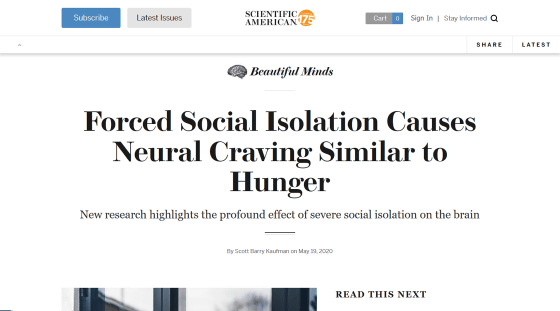Research results that the brain responds to starvation by 'social isolation'

Human beings are social beings, and building stable and good relationships has a positive effect on emotions and thoughts, but loneliness adversely affects people's health and well-being, and
The need to connect: Acute social isolation causes neural craving responses similar to hunger | bioRxiv
https://www.biorxiv.org/content/10.1101/2020.03.25.006643v1
Forced Social Isolation Causes Neural Craving Similar to Hunger-Scientific American Blog Network
https://blogs.scientificamerican.com/beautiful-minds/forced-social-isolation-causes-neural-craving-similar-to-hunger/

Although many studies have shown that chronic loneliness adversely affects the body and mind, the effects of forced social isolation on humans have not been studied deeply. It seems that The Massachusetts Institute of Technology (MIT) research team said, ``If connection with another person is a fundamental desire for human beings, people with deprived social connections have been deprived of food and sleep in their brains. Isn't there a reaction similar to the case?'
When humans want something, it has been shown to increase the production of the neurotransmitter
A 2016 study in mice found that dopaminergic neurons in the midbrain were activated in the same way as other desires when mice isolated from other mice for 24 hours sought social interaction. Was confirmed. However, since mice cannot show a subjective assessment of loneliness, MIT post-doctoral researcher Livia Tomova 's research team conducted experiments on human subjects.

The research team gathered 40 healthy adults with social connections, showed multiple images such as 'social activity that subjects like, food that subjects like,' beautiful flowers, and a reward circuit for different stimuli. Was measured. Subjects were then forced to fast or socially segregate for a total of 10 hours from 9am to 7pm. In addition to being unable to contact other people, socially isolated subjects were also prohibited from actions such as SNS such as Twitter, email, and reading.
After a fast or quarantine, the research team conducted a survey of the subjects, and despite the fact that it was only 10 hours of quarantine and the end time of the experiment was known, the subjects hunger for social connections much stronger than usual, We reported loneliness, discomfort, dislike of loneliness, and decreased well-being. Similarly, even after fasting, people saw a strong craving for food, disgust for hunger, and decreased well-being.
Furthermore, when the research team showed an image of 'subject's favorite meal' or 'subject's favorite social activity' to the subjects who fasted or were isolated, in both cases, strong dopaminergic neuron The reaction was confirmed. Responses varied among participants, with those who showed stronger and more negative feelings of loneliness in the survey responding more to images of social activity.
The variation in the response to loneliness among subjects corresponds to the level of chronic loneliness in daily life before the experiment, and those who are chronically lonely are more likely to have social connections after 10 hours of isolation. The research team reports that the degree of seeking and the reaction of the brain were low. This finding is in line with a previous (PDF file)

The results of this research support the hypothesis that 'social homeostasis' exists at the root of people's desire for social connections, and that humans seek social interactions in the same way as diet and sleep. Regarding future work, the research team said, 'Is the effect of quarantine eliminated if the subject in quarantine checks SNS or if he or she interacts with someone on SNS?' 'Is the effect of quarantine different depending on age? Are mentioned.
In 2020, many people experienced forced social isolation due to the COVID-19 pandemic, but this experiment was conducted before COVID-19 spread to the world, The research team felt that 'this research may be a niche' at the time of writing the paper. However, the COVID-19 pandemic has made forced social isolation a hot topic, the research team said.

Related Posts:
in Science, Posted by log1h_ik







